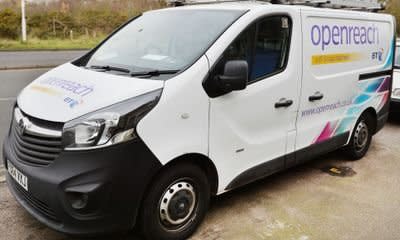Ofcom orders BT 'separation' from Openreach network

Telecoms regulator Ofcom is to order a legal separation between BT and its Openreach network but stopped short of demanding a full break-up.
Ofcom said it was proceeding with the move "after BT failed to offer voluntary proposals that address our competition concerns".
It said it still backed a form of separation in which Openreach remained a wholly-owned subsidiary of BT but warned that if this failed it could reconsider a full split.
The announcement comes hours after Sky News revealed that the telecoms giant was to name former Ofcom director Mike McTighe as Openreach's first independent chairman.
This was likely to be seen as a step in the right direction for the regulator.
:: Why BT is under fire - and how it may respond
Openreach runs the UK's main telecoms network, used by BT's retail division as well as rivals including Sky (Frankfurt: 893517 - news) , the owner of Sky News, Vodafone and TalkTalk.
Those rivals have pushed for a full separation, warning that BT benefits from a conflict of interest.
TalkTalk chief executive Baroness Harding told Sky News that consumers and businesses were "fed up" that their broadband was not working and that Ofcom's move was a small step in the right direction.
Sky said: "BT Openreach has continued to fail consumers.
"This is why we have always said that we want a solution that is clear and executable and in the best interests of consumers and industry."
Richard Neudegg, head of regulation at price comparison site uSwitch, said it was a "last-minute warning shot to BT" but would disappoint those calling for a full break-up.
Ofcom said creating a more independent Openreach, working in the interest of all providers, was a key part of plans to improve broadband and telephone services across the country, with better quality and greater investment.
It set out concerns about the current arrangement in July and has now said it was "disappointed that BT has not yet come forward with proposals that meet our competition concerns".
Ofcom added: "Some progress has been made, but this has not been enough, and action is required now to deliver better outcomes for phone and broadband users."
BT's proposals still fell short on "the transfer of people and assets, and the level of influence that BT Group (Other OTC: BTGOF - news) executives could exert over the management of Openreach".
Ofcom is now proposing for Openreach to become a distinct company with its own board, with a majority of independent directors including the chairman not affiliated with BT.
The company would be guaranteed greater independence on making strategic investments and have a duty to treat all of its customers equally.
Ofcom said it was preparing to notify the European Commission of its plans but remained "open to BT bridging the gap between its proposal and what is required to address our strong competition concerns".
A consultation on the plans will take place next year.
The regulator said an earlier consultation launched in the summer had revealed concerns about slow broadband speeds, the availability of high-speed fibre broadband and the quality of service from major providers.
Ofcom said it had considered calls for a full break-up of BT and Openreach as well as concerns raised by BT about the "substantial costs" this would trigger and the impact on its pension scheme.
It said its current view that Openreach should remain a subsidiary of BT was "likely to achieve the greatest improvements for everyone in the shortest amount of time".
But the regulator warned: "If Ofcom's monitoring suggests that legal separation is not delivering sufficient benefits for the wider telecoms industry and its customers, we will return to the question of structural separation - fully breaking up the companies."
In a statement BT said: "We will continue to work with Ofcom to reach a voluntary settlement. We are in discussions with Ofcom on two outstanding issues, the reporting line of the Openreach CEO and the form of legal incorporation."

 Yahoo News
Yahoo News 